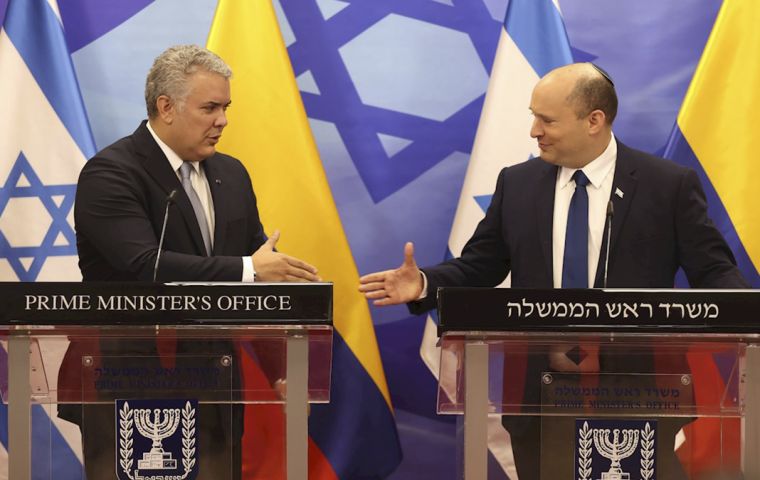MercoPress. South Atlantic News Agency
Colombian President says his country and Israel are sister nations
 Colombian leaders are all out to develop businesses relations worldwide
Colombian leaders are all out to develop businesses relations worldwide Colombian President Iván Duque Monday said his country and Israel were “sister nations” that share principles of defence of democracy and private initiative.
Duque's words came in Jersusalem during a meeting with his Israeli counterpart Isaac Herzog, during which the South American leader confirmed a trade mission (INNpulsa – the Colombian government agency for entrepreneurship and innovation) office was to be open in Jerusalem, in addition to the possibility of having a permanent ProColombia (the agency promoting tourism. exports and investment) delegation at the main trading centres of Israel.
“Colombia and Israel have had diplomatic relations since 1949 and, over the years, they have been strengthening in cooperation, investment and trade. But I dare to say the following: we are today at the highest point in the bilateral relationship, expressed in the fact that during my government the free trade agreement (FTA) between Colombia and Israel has been signed, ratified and put into operation.”
Duque also pointed out that there were already 79 Colombian companies interacting with Israel and “we can, perfectly, triple that number of companies, soon.”
“Colombia and Israel share intelligence information, strategic information and fight against international terrorism. We have struck very important blows thanks to that cooperation,” Duque went on.
“What we have built over the years is not just a business relationship, an investment relationship. We share principles such as the defence of democracy, security as a democratic value and as a public good. And, above all, private initiative is the engine of development. So, President Herzog, thank you for receiving us, for your hospitality and we reiterate that we are waiting for you in our country.” Duque added.
Duque also stressed that INNpulsa's presence in Israel was aimed at turning Colombia into the Silicon Valley of Latin America. He also expressed his interest in working hand in hand with all Israeli technological innovation and entrepreneurship centres. “We are clear, Mr President, that with this relationship there will be many more Colombian companies that will interact with this country. Today we already have 79 and we can, perfectly, triple that number of companies soon.“
The Colombian leader also addressed climate change, biodiversity, sustainability and adaptation, on which he aspires ”that we can also work hand in hand“, and stressed: ”Colombia today leads the energy transition in Latin America, Colombia is moving forward in non-conventional renewable energies,” particularly regarding green hydrogen.
“We have decided that 30% of our territory be declared a protected area by the year 2022. And that, as you and I spoke about it, opens up a huge opportunity so that, through credits of carbon, countries like Israel can also help Colombia participate in financing schemes and, at the same time, within the schemes of carbon markets move towards carbon neutrality.”
The Colombian president added: “With all this, Mr President, I believe that our relations are advancing and we want them to be stronger. And, from now on, I reiterate what I told you in private, and I tell you in public, we want you to visit Colombia, we want you to be able to see on the ground all these areas that we have worked on,” Duque insisted.
Meanwhile, Colombian Vice President and Foreign Minister Marta Lucía Ramírez met Monday in Tokyo with Japan's Cabinet Chief Hirokazu Matsuno. “We want Japanese companies to see Colombia as the best platform to develop their products and reach all markets in the region,” Ramírez said, according to a Colombian Foreign Ministry statement.
Ramírez is on tour in search of cooperation and financing for projects in the field of non-conventional renewable energy and infrastructure.
Both officials also spoke about the joint vision of sustainable economic development that Colombia and Japan share, which, according to Ramírez, opens a window of opportunity for the exploration of new projects and cooperation agreements in areas such as non-conventional renewable energy and infrastructure.
The Vice President also met with Nobumitsu Hayashi, deputy governor of the Japan Bank for International Cooperation (JBIC), to whom she expressed the need for support for Colombia to spread unconventional renewable energies by multiplying by 50 the installed capacity by 2022.
“In this sense, the JBIC offered to be a bridge to attract more Japanese investment to the country in projects of this type and infrastructure,” said the Foreign Ministry.
Ramírez also met with Masato Miyachi, vice president of the Mitsubishi UFJ Financial Group (MUFG), with Makoto Takashima, president of the Sumitomo Mitsui Banking Corporation (SMBC) and with Shinichi Kitaoka, president of the Japan International Cooperation Agency (JICA), with whom she discussed renewable energy and investment opportunities in infrastructure and energy in Colombia.




Top Comments
Disclaimer & comment rulesCommenting for this story is now closed.
If you have a Facebook account, become a fan and comment on our Facebook Page!